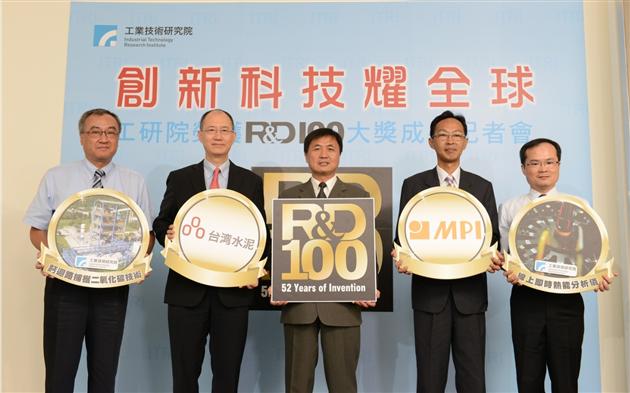Known as the “Oscars of Invention,” the 2014 R&D 100 Awards were announced by R&D Magazine last week in U.S., the Industrial Technology Research Institute (ITRI) again singled out for excellence in technology development. This marks the seventh consecutive year ITRI has won these awards, with its development of eco-related “In-Line Compact Thermal Analyzer (ICTA)” being one of the accolades this year.
ITRI President Jyuo-Min Shyu noted that ITRI was the only Taiwanese concern this year to win the R&D 100 Awards and has been recognized for its technological achievements each year since 2008. The R&D team has developed an efficient thermal analyzer for LEDs. This measurement is used in automated LED production lines to boost production speed and accuracy, along with lowering costs and defect rates. Last year, MPI Corp. engaged in technology transfer with ITRI involving this technology, and it is expected to be put into use on a mass scale this year.
 |
|
ITRI R&D team at the R&D 100 awards. (LEDinside/ITRI) |
Only 0.3 Second Needed for Each LED Thermal Measurement – Offers Merits of Thermal Dispersion
Thermal performance has always been the primary factor impacting the life and light quality of LEDs. ITRI has developed an In-Line Compact Thermal Analyzer, ICTA that can greatly reduce the defect ratio of LED illumination products and put consumers buying these products much more at ease. The rapid thermal analysis technology developed by ITRI can, within three minutes, measure a complete thermal structure of LED device. This technology also has been successfully integrated into automatic LED sorting machine, creating the world’s first automatic thermal analyzer, which offers a measurement speed of 12,000 LEDs per hour and means just 0.3 second per each component. This is 2,000 times faster than the traditional method in a lab in which only six components could be measured per hour.
Currently ITRI and MPI Corp. are engaging in technology cooperation that has yielded world’s first transient thermal structure and in-line thermal resistance analyzer. This equipment is expected to enter the commercialization phase by the end of this year, which will both satisfy R&D and production authentication requirements, as well as provide real-time monitoring on production lines, screening of defective products, optimization of production processes, enhanced efficiency, and significantly lower LED lighting defect rates, all of which will be to the benefit of consumers when purchasing LED products.
ITRI's Electronics and Optoelectronics Research Laboratories General Director C. T. Liu stated that LED will be the primary light source in the future. He pointed to reports by IHS and ITRI's own IEK that indicated that the size of the LED lighting market in 2014 will reach US $30.5 billion, and expand even further to US $51.6 billion in 2018. Heat dissipation, however, remains an important issue in the development of LED, and in fact LED heat dissipation is mainly determined by the level of thermal resistance of the LED component. Accurate thermal data paves the way for estimating product lifespan, efficiency, and light quality.
Traditional methods of measuring LED thermal resistance required an analysis of each layer of the LED components, which was both complex and time-consuming, and only allowed for measurement in the laboratory at the product design stage. The ICTA developed by the ITRI project team can provide real-time measurements on the production line and analysis of the LED thermal dissipation capacity die-attached. This offers the advantage of ensuring thermal dissipation of all LED products, creating higher quality and more stable LED lighting products.












